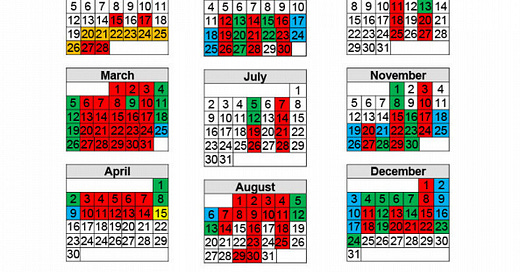The Spiritual Discipline of Fasting
What is it? How is it different from other church's fasting practices?
For those unfamiliar with Orthodoxy, let’s set the record straight from the get-go: even in the strictest fasting times of the church calendar, Syriac Orthodox believers do not go without food or drink entirely.
When inquiring about the Syriac Orthodox faith, I kept hearing about fasting, and quite frankly, I was confused. The Great Lent fast is 40 days, culminating with more fasting for seven weeks during the Passion Week leading up to Resurrection Sunday. How can anyone fast that long, and their name isn’t Jesus or Moses? 🤦♀️ I was puzzled at first.
It became a lot clearer when someone explained that fasting does not mean not eating. Instead, it means being mindful of when and what you eat. The purpose of the fast is to submit your body to a level of physical hunger, which in turn suppresses the passions and refocuses it on Christ.
The Syriac Orthodox Church observes six fasts1:
Fast of Nineveh: Three days commencing on the Monday of the third week before the Great Lent.
The Fast of Pesach: Forty-eight days before Easter.
Christmas: Ten days commencing on the 15th of December.
Fast of the Apostles: Three days commencing on the 26th of June.
Fast of the Virgin Mary: Five days commencing on the 10th of August.
Wednesday and Friday Fast: Every Wednesday and Friday around the year, except the 50 days between Easter and Pentecost and any feast of the Lord or the Virgin Mary.
As mentioned, most Wednesdays and Fridays of the year are fasting days for the faithful. Wednesdays are fast days to commemorate Judas’ betrayal of Jesus, and on Fridays, the faithful commemorate Jesus’ crucifixion. There are some breaks from this, such as between Easter and Pentecost, as the adherents of Syriac Orthodoxy (and other parts of Orthodoxy) celebrate the resurrection of Jesus Christ, having trampled death by his death.
Other Orthodox churches have similar fasting calendars, although they may not 100% overlap. The church fasts. Not individuals per se. That is a beautiful thing to realize. Here is an example of an Antiochian Orthodox fasting calendar for 2023:
(Note: the Roman Catholic Church has a much-reduced concept of fasting, which will not be discussed here.)
So what does this look like?
The (reposed in the Lord) Patriarch of the Syriac Orthodox Church, His Holiness Moran Mor Ignatius Zakka I Iwas, stated it as this2:
Fasting is a voluntary act of abandoning worldly life. It is a sign of man’s obedience to, and respect of God’s laws and his observance of God’s offices by his voluntary abstinence from food or drink for a specific period of time, by the end of which he can eat light, small and fat-free meals, consisting of cereals, beans fruits, and vegetable oils, with olive oil recipes being referred to if needed. A fasting person refrains from eating meat and animal products except for fish and all seafood and honey because bees are insects with no fleshly lust.
Practically speaking, eating no food until lunch or even 3 pm is what many faithful will follow. This is then followed by sized-down vegan meal or meals. Depending on the tradition, in addition, you may have fish (Syriac Orthodox) or shellfish only (Eastern Orthodox). Here is a restaurant offering Syriac Orthodox Lenten Fast meals, for an idea of what that might look like: https://syrianhomecooking.com/syrian-orthodox-lenten-supper/.
Eating vegan means no animal-based products are included in one’s diet. So instead of milk in one's coffee, one might drink it black or use a plant-based creamer, such as oat milk.
It is easy to do, especially as it is only one aspect of the ascetic discipline during fasting periods. The time saved cooking elaborate meals might be better spent praying or giving alms to people experiencing poverty.
Interestingly enough, the scientific community has agreed that Orthodox fasting periods are pretty beneficial to the participant’s health: Greek Orthodox fasting, which is quite similar, was studied and found that “[a]dherence to Greek Orthodox fasting periods contributes to a reduction in the blood lipid profile including a non-significant reduction in HDL cholesterol and possible impact on obesity.”3
More importantly, as mentioned, it opens up the spiritual calendar to prayer, almsgiving, and participation in ecclesiastical celebrations.
Personally speaking, my husband lost about 15 lbs., and I lost about 10 lbs. during our first time out participating in the Great Lent fasting period. Our blood pressure is normal, and we feel great. What's not to love about Orthodoxy?
The best part, not to be forgotten, is drawing close to the Lord Jesus Christ because a worshipper has time to think about what his Lord went through for him or her during these phases of fasting. That is where the real power of the fasting discipline lies. The desert fathers of old and monks of today can teach the faithful much about the benefit to their spiritual well-being by the ascetic practice of fasting.
See also this explanatory document by the late Patriarch H.H. Ignatius Zakka I Iwas, kindly translated from Arabic by Abouna Zmargdos in May 2023: https://1drv.ms/b/s!Aka0kDpKwp0bgqBv5BJhGlq_vYOPwQ?e=jtkd7v
Archdiocese of the Syriac Orthodox Church for the Eastern United States. Fasting. https://syrianorthodoxchurch.org/2010/05/fasting/, accessed 5/9/2023.
Sarri KO, Tzanakis NE, Linardakis MK, Mamalakis GD, Kafatos AG. Effects of Greek Orthodox Christian Church fasting on serum lipids and obesity. BMC Public Health. 2003. https://www.ncbi.nlm.nih.gov/pmc/articles/PMC156653/, accessed 5/9/2023.





Hello,
I’m a syriac from Belgium.
I find that your publications are very good. Continue to publish it's great